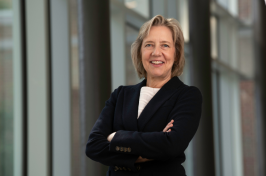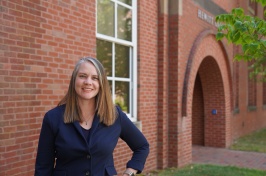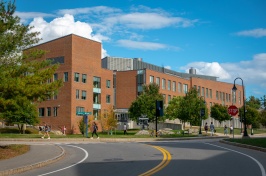UNH Broadband Center of Excellence Completes Trial of White Space Technology
DURHAM, N.H. -- The University of New Hampshire's newly created Broadband Center of Excellence (BCoE) has completed its trial of wireless broadband technology known as TV White Space (TVWS). The trial demonstrated the ability to convey Internet data at downstream rates exceeding 1 megabit per second by making use of unlicensed frequencies in spectrum bands allocated to over-the-air television signals.
The four-month trial, conducted as part of the Gigabit Libraries Network's White Space Project, connected four Durham buildings through a TVWS network that supplied high-speed Internet connectivity over vacant spectrum within VHF/UHF bands reserved for over-the-air television transmission.
TVWS uses unlicensed, high-performance frequencies to enable the transmission of Internet traffic wirelessly over long distances. Although it remains in early stages of experimentation, TVWS technology is gaining attention as a possible solution for filling in broadband availability gaps - and in some cases serving as an alternative to existing broadband networks.
BCoE, established in October 2013, is an interdisciplinary effort designed to establish the university as a global leader in maximizing the effectiveness of broadband on commerce, innovation, competitiveness and quality of life. Its four key objectives are to: promote UNH as a fully broadband-enabled university and thought leader; engage with corporations, industries and other technology leaders to expand broadband research; assist communities around the globe to realize broadband benefits; and influence public policy and regulation.
BCoE Executive Director Rouzbeh Yassini has developed two white papers that look at the future of broadband. "Broadband 2020: Achieving Ubiquity" reviews potential obstacles to ubiquitous deployment of the services and technology, and offers insights to remove these impediments. "Broadband 2030: The Networked Future" offers insights on the future of broadband, based on trends in bandwidth usage and software development. Both reports are available at www.unhbcoe.org
"The BCoE is meant to be a global center of excellence and to empower every citizen of the world to have access to basic broadband while pushing for gigabit broadband connectivity as a minimum requirement," Yassini said. "We are committed to fostering a collaborative atmosphere as we seek to guide programs toward opportunities in the broadband industry."
UNH BCoE will hold an annual conference to share findings.
What is Broadband?
Broadband, as defined by the FCC, is two-way delivery of digital content at 4 million bits per second (four megabits) to a household or business, and one megabit out of the home or business to a network data center. A major driver of broadband is high-speed Internet access made available by cable, telecommunications companies, and other providers.
Yassini is widely known as the father of the cable modem for his pioneering work at LANcity, an early cable modem manufacturer. Following his stint as CEO at LANcity, Yassini led a team that created the global standard for the delivery of high-speed Internet services over cable modems.
The vast majority of households in the United States have access to broadband services but a large portion of customers have declined the service - some citing cost and others who do not want to have to purchase a personal computer. Globally, the International Telecommunications Union reported in fall 2013 that about 60% of the world's population - about 4.4 billion people - lack access to the Internet at all.
But broadband has become a necessity. It seems to touch every aspect of our lives and work, whether it's entertainment, social networking, emergency response, health care, energy management, or homeland security. Some see its value as equivalent to the introduction of electricity in the late 19th century.
The University of New Hampshire, founded in 1866, is a world-class public research university with the feel of a New England liberal arts college. A land, sea, and space-grant university, UNH is the state's flagship public institution, enrolling 12,200 undergraduate and 2,300 graduate students.
-30-
A copy of the report is available for download: www.unhbcoe.org.
-
Media Contact
Mike Schwartz | Broadband Center of Excellence | Michael_schwartz@comcast.net | 303-204-5085
Latest News
-
October 8, 2025
-
October 2, 2025
-
September 24, 2025
-
September 15, 2025
-
August 21, 2025















































